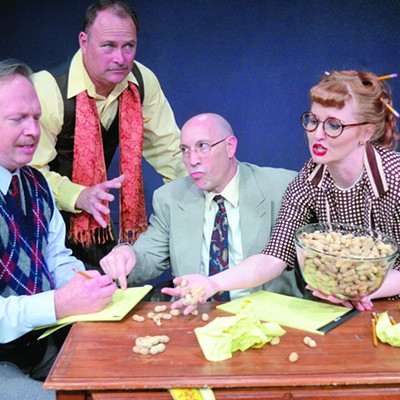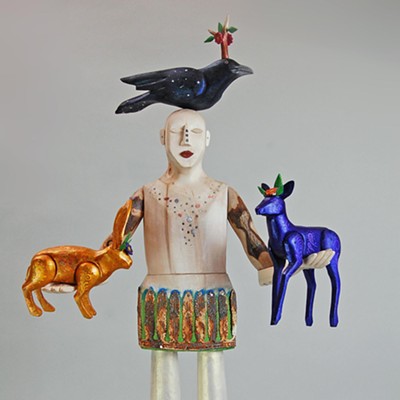New Albany, Indiana is a border town, of sorts. A suburb on the Indiana Edge of the Ohio River, its dominant culture is that of urban Kentucky, specifically, Louisville, on the opposite bank. The town's geography also puts it on a border once known as the Mason-Dixon Line. And Houndmouth's point of departure straddles the millennium turn.
A listener might not independently divine all of that from a cursory listen to Houndmouth's music, but once you know it, you can sit back and enjoy the stew without trying to pinpoint the ingredients. They're suburban kids messing with pretty much everything within reach, and in the age of the Internet, that's pretty much everything. But their field of vision fuzzes a bit outside their grasp of the American heartland.
"It's hard to put your finger on," says Houndmouth member Katie Toupin, "but I think anyone who makes art is influenced by their environment, and their work will be distinctive in that way."
The band is often compared to the Drive by Truckers, peerless balladeers of contemporary Southern culture, and the Alabama Shakes, powerfully disruptive new proprietors of the blues legacy. Toupin says that Houndmouth is flattered by such comparisons, but feels they're wide of the mark. Or perhaps not wide enough.
"Most often we're compared to The Band," she says, speculating that it's because of how Houndmouth structures its four-part harmonies. It must be said that those could as easily be compared to the Mamas and Papas'. "But," Toupin adds, "I think that's sort of limiting. We're all over the place. We mix genres. We use a lot of dynamics."
Houndmouth members Zak Appleby (bass), Shane Cody (drums) and Matt Myers (guitar) all took up instruments in junior high school and later played in bands of the blues, indie rock, cover and/or metal persuasion, in pairs or individually. Toupin began studying guitar and music theory almost from infancy with her father—a professional blues guitarist. Toupin met Myers at a coffee house event where she was impressed with his playing ("He's still my favorite guitar player," she says of Myers.) and the two began gigging as a cover duo, both playing guitar and harmonizing.
In 2011, the four converged into Houndmouth, taking the name from their first recording experience. "We needed a name," Toupin explains, "because we had a gig." As they were recording an initial track for their unnamed band, street noises, including a lot of dogs barking, kept turning up on the tape. "Someone said, 'There's too much hound mouth on that track,' Toupin says. "So we went with it."
It was also name destined to unintentionally snare fans in search of a breed like alt-country journeymen Slobberbone or Honeydogs. Not a bad thing., but it was those next-generation roots music lovers who put them on the map by making the YouTube video of their gospel-tinged "Penitentiary" an internet sensation. Toupin refers to the internet as the band's MVP.
The surprise hit earned them a life-changing invitation to perform a showcase set in an obscure Austin hole in the wall at the 2012 SXSW Music Conference. It was just the sort of thing everyone will tell you never happens: The owner of giant indie label Rough Trade was in the room, and by the time their set ended, he was ready to ink a deal.
No one in Houndmouth had ever so much as played out of town before. Yet their first EP was released in 2012 on Rough Trade, an imprint of the U.K.-based international behemoth, Beggars, Inc. Within a year Rough Trade released their first LP, From the Hills Below the City, and they began touring as openers for the likes of the Drive By Truckers and Alabama Shakes. Soon they were fielding invitations from Conan and David Lettermen.
Despite the buzz, though, life hasn't become some crazy rock 'n' roll party. Toupin says she doesn't like to stay out late, and prefers to spend time with friends and family. But Houndmouth still hints at the hard side of the lifestyle in the lyrics to "My Cousin Greg," a song on the band's 2015 release, Little Neon Limelight. The idea for the song arose from conversations Myers frequently has with his cousin, a high-priced beaker jockey in the lab coat world who envies what he envisions as Myers' rock star milieu. The song's hooky refrain, in indelible four part harmony, goes:
"If you wanna live the good life/Well, you better stay away from the limelight."
There's also the matter of growing up in the spotlight as a band. Toupin points out that the quartet already were friends and bandmates, albeit in different configurations in bands with widely divergent sounds. Even though Houndmouth's notoriety took off before they had much time to bond for the long haul, they surged ahead with a solid commitment to fully sharing creative responsibilities.
"Every band member has a vote," Toupin says. "We all have a say. If sometimes someone feels a little hurt when their ideas are voted down, we just put it behind us. It's part of being a band." She says the best advice anyone ever gave her is "Pick your battles," and if she feels strongly about an idea, she's willing to push until the band at least tries it.
While playing live, Toupin enjoys playing "Gasoline" from Little Neon Limelight particularly because she gets to play guitar—her first instrument. Fan favorites, she says, are "Say It," recently released as a single from Limelight and now getting a lot of internet buzz, and also "Sedona," the previous single from the new release.
"'Sedona" is, in fact, about Sedona, Arizona. Its tempo even suggests the feel of driving through the desert and the upcountry terrain surrounding that breathtaking work of nature that's served as a spiritual center for centuries of human habitation. The song's melody even evokes a late afternoon sun wash on those red spires and cliffs.
"Everyone knows it and sings along," Toupin says, but she admits "We've never been there. We were just reading that, I guess, 60 some movies were made there. It was called 'Little Hollywood.'"
The Houndmouth song, "Sedona," regards it in a fantasy, in such characteristically telling lyric detail you'd think they'd been there: "And I remember I remember when your neon used to burn so bright and pink, so bright and pink/A Saturday night kinda pink."












